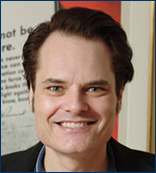When Police Officers Use Deadly Force, Can Judges Ever Be Trusted to Judge Them?
That is the question that lurks behind a fascinating new paper by Dan Kahan, David Hoffman, and Donald Braman. The paper responds to Scott v. Harris, 127 S. Ct. 1769 (2007), in which the Supreme Court held that summary judgment was properly granted to a police officer in a § 1983 lawsuit challenging the officer’s decision to ram his police car into the car of a fleeing motorist. One of the paper’s authors, Dan Kahan (pictured at left), is visiting the Law School today to present the paper at a faculty workshop. (Dan will also be delivering the Boden Lecture here late this afternoon.) The paper begins by taking issue with a particular, case-specific assertion by the majority in Scott, but then opens up some much deeper questions about the roles of judge and jury in a culturally diverse democracy.
The majority in Scott relied on a videotape of the fleeing motorist, which purported to show that he was driving in such a dangerous manner as to justify the use of deadly force to stop him. The majority found the videotape sufficiently compelling that, in its view, no reasonable juror could find in favor of the motorist on his claim that the police officer had acted unreasonably in violation of the Fourth Amendment–thus, warranting a grant of summary judgment. Kahan and his coauthors, however, showed the same videotape to a diverse sample of 1,350 Americans, and found evidence of some disagreement with the majority’s view of the case. Thus, had the case been permitted to go to a jury, there is a statistically sound basis for expecting that one or more of the jurors would have had a considerably less positive view of the officer’s conduct than did the members of the Supreme Court.



